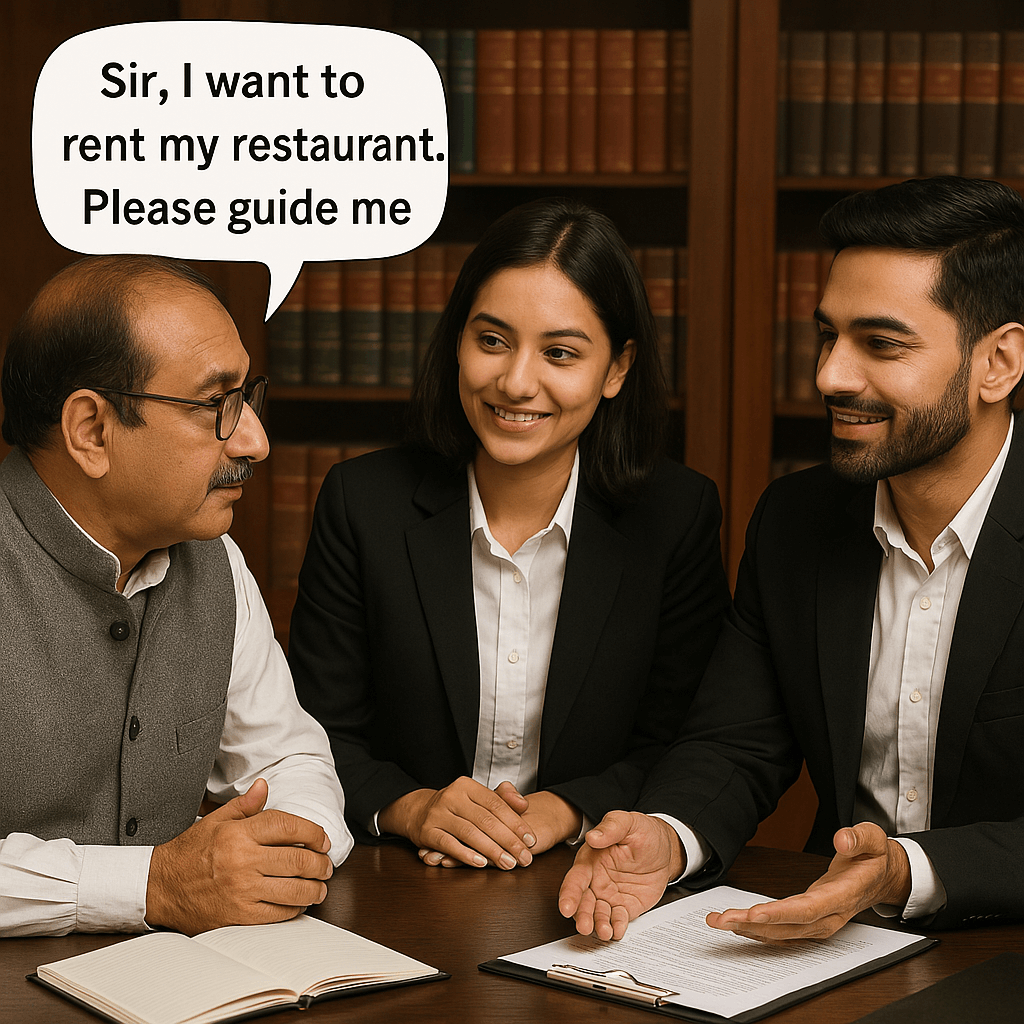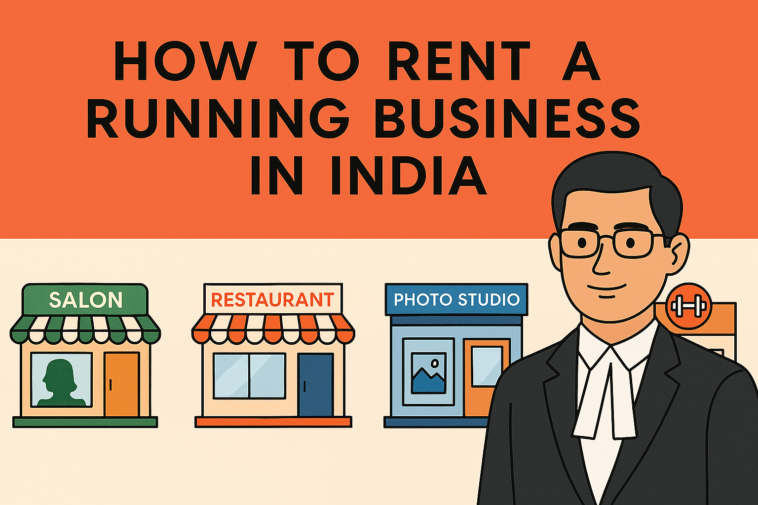Many people today are choosing to rent out their operational businesses—salons, restaurants, gyms, or coaching centers—for monthly income, instead of shutting them down. On the other side, new entrepreneurs want ready-made businesses so they can start earning immediately by rent a business in India.
But here’s the catch: without a proper legal business lease agreement, this “win-win” setup can quickly turn into a legal headache.
In this guide, Advocate Vinod Kumar, legal advisor and founder of LegalMate India, explains how to rent your running business legally and smartly.
What Does “Rent a Business in India” Mean?
This is like renting a property in India, you earn while renting your flat/room. In simple terms, you keep ownership, but another person operates the business and pays you either a fixed monthly rent or a share in profits.
This is common in:
- Salon and spa businesses
- Restaurants and cafés
- Photography studios
- Coaching centers
- Gyms and fitness studios
The new operator gets a ready-to-use setup. You earn passive income. But again, the key is a solid agreement.
Why You Need a Business Lease Agreement?
Just like a flat rental requires a house rent agreement, leasing a business needs a business lease agreement. This document protects both parties and avoids confusion or legal risks.
Key reasons:
- Prevents misuse or unauthorized selling of your brand/equipment
- Sets clear rules about rent, duration, and business conduct
- Protects both the business owner and the tenant if disputes arise
- Helps in renewing or exiting the contract peacefully
- Ensures compliance with government authorities and tax systems
“Business leasing without a legal agreement is like giving your car to someone without insurance,” — Advocate Vinod Kumar, LegalMate India.
What Kind of Businesses Can Be Rented Legally?
f it runs in a shop or commercial space, chances are—you can lease it.
Here are examples of businesses commonly rented or leased:
- Beauty salons and spas
- Restaurants, dhabas, or cafés
- Photography or video editing studios
- Gyms, yoga studios, fitness centers
- Coaching institutes or tuition centers
- Printing shops or cyber cafés
- Tailoring shops or designer boutiques
- Tattoo or nail art studios
- Grocery or general stores
Even small setups in semi-urban or rural areas can be legally rented out.
Two Popular Business Renting Models in India
You can charge fixed rent or share in profits—choose what works for you.
1. Fixed Monthly Rent Model
Tenant pays you a fixed amount every month, no matter how much profit they earn. It’s like renting a shop.
2. Revenue or Profit Sharing Model
You and the tenant share a percentage of monthly sales or profits. This works well when you both want to grow the business together.
💡 Tip: Always mention the model clearly in the agreement.
What to Include in a Business Lease Agreement
The more specific you are, the more legally secure you’ll be.
Your business rent agreement must clearly outline:
- 👤 Names and addresses of owner and tenant
- 🏪 Full business details (type, brand, location)
- 💰 Rent or revenue sharing model, payment dates
- 🔐 Security deposit, notice period, renewal terms
- 🪑 Equipment, furniture, inventory details
- 👩💼 Staff arrangement – who retains/pays them
- 📄 License ownership – GST, FSSAI, Trademark, shops & establishment
- 💡 Maintenance & utility bills – who pays what
- ❌ Exit & termination clause – early cancellation, conditions
- ⚖️ Jurisdiction and dispute resolution mechanism
“Even simple things like who pays the water bill should be written clearly. That’s what saves you later,” – Advocate Vinod Kumar
Applicable Laws and Sections for Renting a Running Business in India
Understanding the law ensures that your business rent agreement is not just written—but legally enforceable.

Renting a business—like a salon, restaurant, or studio—involves various legal provisions from different laws. Whether you’re the owner or tenant, these are the key Acts and sections that protect your rights.
1. 📝 Indian Contract Act, 1872
Sections 10 to 75 deal with valid contracts, breach, damages, etc.
- Your business lease agreement is governed by this Act.
💡 Key Sections:
- Section 10 – What agreements are contracts
- Section 73 – Compensation for loss or damage due to breach
2. 🏠 Transfer of Property Act, 1882
Covers lease definitions and legalities when a business premises is rented.
💡 Key Sections:
- Section 105 – Lease defined
- Section 108 – Rights and liabilities of lessor and lessee
📌 If lease exceeds 11 months, register it under Registration Act, 1908.
3. 📄 Rent Control Acts (State-wise)
Regulates rent caps and eviction terms in commercial premises across various states.
Examples:
- Delhi Rent Control Act, 1958
- Maharashtra Rent Control Act, 1999
4. 💼 Shops & Establishments Act
Governs registration of operating businesses. Ensure this is updated in tenant’s name when business control shifts.
5. 🏢 GST Act, 2017 (if applicable)
- Renting commercial property attracts GST
- Input credit and invoice documentation required
6. ⚖️ Indian Easements Act, 1882
If business involves shared use of property (e.g., corridor, water tank), easement rights apply.
“When drafting your business rent agreement, we apply all relevant legal principles from the above laws to make the document rock-solid,” — Advocate Vinod Kumar
Common Mistakes to Avoid For Rent a Business in India
Verbal promises can cost you big. A written agreement is your shield.
- Proceeding without a signed agreement
- Not verifying business licenses and past dues
- Ignoring equipment handover or condition reports
- No clarity on brand or staff rights
- Forgetting to include renewal and exit clauses
LegalMate recommends registering the agreement if the lease is for over 11 months.
Pre-signing Checklist (Don’t Skip This!)
Just before signing, do this quick legal hygiene check.
- Verify all licenses (FSSAI, GST, trade license)
- Check for any pending electricity/water bills
- Prepare an inventory list of assets
- Get agreement reviewed by a lawyer
- Add photos of the shop or business assets as annexure
- Make sure both parties keep signed copies
How LegalMate India Can Help You
We don’t just draft agreements—we protect your business interests.
At LegalMate India, we assist with:
- Salon rent agreements
- Restaurant lease contracts
- Studio rental terms
- Staff transfer clauses
- Registration, stamp duty & compliance
“Every business deal deserves a strong legal foundation. That’s what we offer at LegalMate India,” — Advocate Vinod Kumar
Before leasing out your salon, restaurant, or studio, draft a clear, custom business lease agreement. It’s your security tool—and a sign of professionalism.






